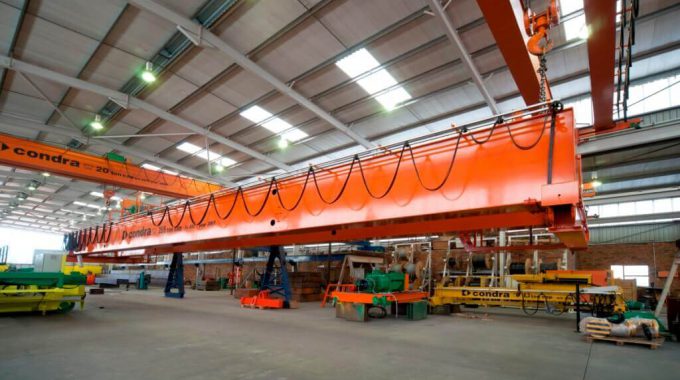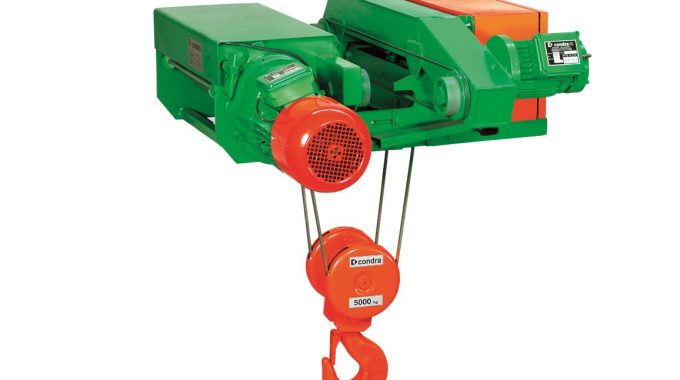The first two of six cranes making up a multi-million Rand manufacturing contract for Condra’s Johannesburg works have been delivered and installed on site at a new mining development project in the Northern Cape.
A third crane, already completed and now undergoing testing, will be delivered early in December.

Condra 40/8-ton dual-hoist double-girder electric overhead travelling crane for the Northern Cape mine development project, seen here undergoing testing at Condra’s Johannesburg factory in late November 2017.
Three more machines for the project are in the design phase, while Condra will also manufacture four hoists and miscellaneous spreader beams for the mine.
The two initial cranes were both 10-ton single-girder electric overhead travelling units ordered by the main structural steelwork contractor for the concentrator plant.
Condra’s affiliate company, Transcon Hauliers, supplied steerable dollies for transport to site, and also oversaw delivery and installation.
The third crane for the mine, currently undergoing testing, is a bigger, 40/8-ton dual-hoist double-girder electric overhead travelling machine with a span of 23 metres. It will be used for mill plant maintenance.
All three cranes were manufactured on very short lead times of 90 days, and all were manufactured to blanket technical specifications and quality control procedures laid down by the mine developers, which will allow the first two machines to be handed over to the mine for future use after the structural steelwork is complete and the contractor has left site.
Commenting on the order, Condra’s managing director, Marc Kleiner, said that stringent quality control procedures had made the short lead times a challenge.
“Hold points at various stages of manufacture allowed for layout inspections, magnetic particle inspections, ultrasound and X-ray inspections,” Kleiner explained.
“There were also assembly inspections, blast profile inspections ahead of painting, and a final, dry film thickness inspection after the painting of each crane was complete.
“Production was halted at each of these hold points, which made meeting the lead times something of a challenge, but we nevertheless completed all three cranes on schedule. We are looking forward to having a little more time on the next three machines,” Kleiner said.
Although the six cranes are for different companies working on the new mine development, industry observers have pointed to a common thread of robust design and proven machine reliability as being the key to Condra’s successful bids, since all customers have experience of cranes from this manufacturer serving reliably for many years in similarly demanding operational environments.
Asked to elaborate on Condra’s design capability, Kleiner said that the design team had submitted a selection of designs from which the steelwork contractor could choose. The single-girder option on the 10-tonners was found to deliver an optimum combination of capacity, lift height and speed, while the larger size of the 40/8-ton crane necessitated a double-girder design, he said.
Condra routinely executes design, manufacture, delivery, installation, commissioning, servicing, load testing and certification as a turnkey offering to customers worldwide, using a fully developed logistical network to enable this level of service.
The company claims a parts delivery time of just 24 hours anywhere in South Africa, and a maximum of 72 hours to all countries within the SADC except the Democratic Republic of the Congo, where customs procedures sometimes extend the delivery time.
“Deliveries to European countries take a bit longer,” Kleiner elaborated, “as customs procedures differ across Europe.
“Our Bulgarian factory recently delivered a shipment of three sets of end-carriages to a customer in the UK, and this took two weeks, whereas our deliveries into Russia and surrounding countries usually need only eight or nine days,” he said.
Outside Africa, the bulk of the company’s export orders come from Chile, Canada, Russia, Bulgaria and various eastern European states.
“We are working to expand our presence in the western European market, but this is taking longer than we would like because of a strong defence by crane manufacturers based there,” said Kleiner.

Condra 40/8-ton dual-hoist double-girder electric overhead travelling crane for the Northern Cape mine development project, seen here undergoing testing at Condra’s Johannesburg factory in late November 2017.
“However, we are receiving steady orders for sub-assemblies such as end-carriages and hoists, and we continue to work hard to achieve initial orders of complete cranes into that part of the world,” he concluded.




